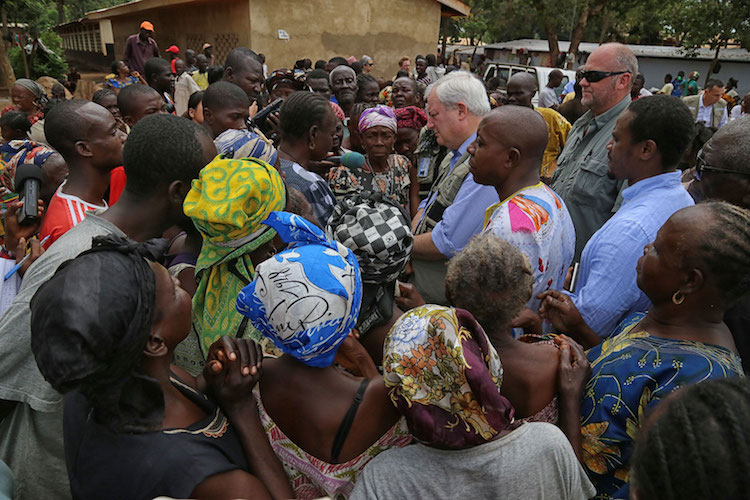By J Nastranis
NEW YORK (IDN) – The United Nations Office for the Coordination of Humanitarian Affairs (OCHA), which manages the Central Emergency Response Fund (CERF) on behalf of the UN Secretary-General, estimates that this year, there will be a $50 million shortfall on the annual $450 million funding target.
“I am very concerned that this could force the Fund to significantly reduce allocations for underfunded emergencies in the future,” the UN Emergency Relief Coordinator, Stephen O’Brien, has said, and appealed to all UN Member States, regional organizations and private citizens “to scale up their support to CERF and enable us to save more lives”.
So far, the Fund has received $311 million in contributions for 2016 and disbursed nearly as much to 35 countries for life-saving activities around the world.
According to O’Brien, in recent years, the global refugee crisis has put enormous pressure on CERF to help millions of people fleeing conflicts that linger for lack of a political solution. As such, and in light of other ongoing challenges and conflicts, he emphasized that all humanitarian emergencies are underfunded this year.
“I wish I could allocate more CERF funds to these and other protracted crises, given the enormous needs. However, contributions to the Fund are limited and demand from humanitarian partners around the world is high,” he said.
In an interview with UN News Service, just ahead of World Humanitarian Day, O’Brien nevertheless assured that the global humanitarian community would not let political disagreements, conflicts or natural disasters stand in the way of helping the people who are in dire need.
“We have to be their hope; that we can be the ones to reach them, even if nobody else can,” said O’Brien. He added that it is also equally important that humanitarian actors, who are neutral and impartial, are provided with safe and unimpeded access.
On August 16, he released $50 million for severely underfunded aid operations in six neglected emergencies around the world from the CERF, which supports urgent, life-saving humanitarian responses,
The new funding will provide critical assistance for two million people in dire humanitarian need, including 200,000 refugees, 665,000 internally displaced persons, 170,000 returnees and 530,000 people in host communities.
“This funding is a lifeline for the world’s most vulnerable people caught up in forgotten crises,” O’Brien said in a press release issued by the UN Office for the OCHA, which he heads.
The allocation will allow humanitarian partners to respond to protracted emergencies in Central Africa, caused by armed conflicts, political instability and human rights violations, and compounded by food insecurity and disease outbreaks.
It will benefit aid operations in the Central African Republic, Chad, and the Democratic Republic of the Congo (DRC), as well as Rwanda, which is hosting refugees from Burundi and DRC. A portion will also support aid operations in Eritrea in responding to current needs due to arid conditions and poor rains.
The new funding will also boost relief operations in Yemen where an estimated 21.2 million people require humanitarian assistance.
This release brings the total allocation from the CERF’s underfunded emergencies window in 2016 to $150 million.
Speaking specifically about the desperate humanitarian situation Syria, the UN relief chief underscored in the interview the urgency of ensuring safe access for relief workers.
“[Parties to the conflict] and all those who have influence on them [need] to recognize [that now] is the time to have a ceasefire […] and that there is safety for humanitarians to get in to meet those needs,” he stressed.
O’Brien also praised the bravery of humanitarian workers in the country, where intense fighting has not only put the lives of many at risk, but also severely impeded their ability to access or deliver humanitarian assistance to the people in need.
In the interview, just ahead of World Humanitarian Day, O’Brien, who is also the UN Under-Secretary-General for the Coordination of Humanitarian Affairs, said the Day is an occasion for everyone, as global citizens, to reflect on the opportunity and to make a real contribution to meeting the needs of the human beings on this planet who’re the most vulnerable.
He added that the Day is also linked to the first-ever World Humanitarian Summit, which was held in Istanbul, Turkey, in late May.
The Summit provided a common purpose and understanding of the need to have strong political will to sustain the resources necessary to be able to respond to the needs of the more than 130 million people who require urgent live-saving assistance, explained O’Brien.
Asked about his main message for World Humanitarian Day, O’Brien said the UN and its humanitarian partner are ready: “We have the capacity, we have the skills, we have the people to be able to deliver, for people who have real life-saving and protection needs tonight.”
“But to do that, not only do we need the resources […], we need to work very well together to make sure that we use these resources efficiently [and] the humanitarians, as a matter of international law, must have safe, unimpeded access to wherever the need arises, however it has arisen, so we can deliver to meet the needs, he said.
Returning to the challenges aid workers are facing in Syria, the top UN humanitarian official highlighted: “Our challenge is not only to respect in the courage of their bravery, but also to recognize that we have a duty to make sure that they are safe in delivering their selfless work.”
“These are not suicidal missions, these are courageous missions. And we need to make sure that those who are causing the fighting – those who are causing the blockages – are challenged because it is a matter of right that we meet the humanitarian needs of the people,” he concluded. [IDN-InDepthNews – 18 August 2016]
Photo: Under-Secretary-General Stephen O’Brien pays a visit to a camp in Saint Saveur, Central African Republic. MINUSCA/Nektarios Markogiannis
IDN is flagship of the International Press Syndicate.

